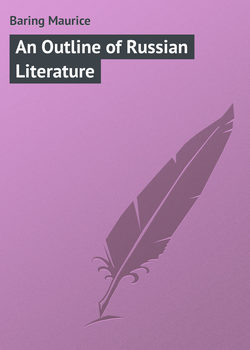An Outline of Russian Literature

Реклама. ООО «ЛитРес», ИНН: 7719571260.
Оглавление
Baring Maurice. An Outline of Russian Literature
PREFACE
CHAPTER I. THE ORIGINS
CHAPTER II. THE NEW AGE – PUSHKIN
CHAPTER III. LERMONTOV
CHAPTER IV. THE AGE OF PROSE
CHAPTER V. THE EPOCH OF REFORM
CHAPTER VI. TOLSTOY AND DOSTOYEVSKY
CHAPTER VII. THE SECOND AGE OF POETRY
CONCLUSION
CHRONOLOGICAL TABLE
Отрывок из книги
For the purposes of the average Russian, and still more for the purposes of the foreigner, Russian literature begins with the nineteenth century, that is to say with the reign of Alexander I. It was then that the literary fruits on which Russia has since fed were born. The seeds were sown, of course, centuries earlier; but the history of Russian literature up to the nineteenth century is not a history of literature, it is the history of Russia. It may well be objected that it is difficult to separate Russian literature from Russian history; that for the understanding of Russian literature an understanding of Russian history is indispensable. This is probably true; but, in a sketch of this dimension, it would be quite impossible to give even an adequate outline of all the vicissitudes in the life of the Russian people which have helped and hindered, blighted and fostered the growth of the Russian tree of letters. All that one can do is to mention some of the chief landmarks amongst the events which directly affected the growth of Russian literature until the dawn of that epoch when its fruits became palpable to Russia and to the world.
The first of these facts is the existence of a Slav race on the banks of the Dnieper in the seventh and eighth centuries, and the growth of cities and trade centres such as Kiev, Smolensk, and Novgorod, which seem already to have been considerable settlements when the earliest Russian records were written. Of these, from the point of view of literature, Kiev was the most important. Kiev on the Dnieper was the mother of Russian culture; Moscow and St. Petersburg became afterwards the heirs of Kiev.
.....
This change of point of view proved disastrous for the writer of what is the most thoughtful book of the age: namely Radishchev, an official who wrote a book in twenty-five chapters called A Journey from St. Petersburg to Moscow. Radishchev gave a simple and true account of the effects of serfdom, a series of pictures drawn without exaggeration, showing the appalling evils of the system, and appealing to the conscience of the slave-owners; the book contained also a condemnation of the Censorship. It appeared in 1790, with the permission of the police. It was too late for the times; for in 1790 the events in France were making all the rulers of Europe pensive. Radishchev was accused of being a rebel, and was condemned to death. The sentence was commuted to one of banishment to Eastern Siberia. He was pardoned by the Emperor Paul, and reinstated by the Emperor Alexander; but he ultimately committed suicide on being threatened in jest with exile once more. Until 1905 it was very difficult to get a copy of this book. Thus Radishchev stands out as the martyr of Russian literature; the first writer to suffer for expressing opinions at the wrong moment: opinions which had they been stated in this case twenty years sooner would have coincided with those published by the Empress herself.
Catherine’s reign, which left behind it many splendid results, and had the effect of bestowing European culture on Russia, produced hardly a single poet or prose-writer whose work can be read with pleasure to-day, although a great importance was attached to the writing of verse. There were poets in profusion, especially writers of Odes, the best known of whom was Derzhavin (1743-1816), a brilliant master of the pseudo-classical, in whose work, in spite of its antiquated convention, elements of real poetical beauty are to be found, which entitle him to be called the first Russian poet. But so far no national literature had been produced. French was the language of the cultured classes. Literature had become an artificial plaything, to be played with according to French rules; but the Russian language was waiting there, a language which possessed, as Lomonosov said, “the vivacity of French, the strength of German, the softness of Italian, the richness and powerful conciseness of Greek and Latin” – waiting for some one who should have the desire and the power to use it.
.....